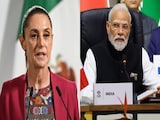Along with anti-incumbency and a strong narrative by the opposition, the BJP's diminished performance in the 2023 Karnataka election is perhaps an indictment of its social engineering strategies.
Before the election, the BJP made two bold moves - one, to wean away from dependency on strong Lingayat political leaders who have usually held the reins of the BJP in Karnataka; and second, denying candidature to what it perceived to be unpopular MLAs. This, said BJP strategists at the time, was a playbook adopted from Gujarat and Madhya Pradesh to counter anti-incumbency, where 'Hindutva' often trumped caste calculations and the individual influence of MLAs.
Data from the 2023 election shows that the BJP failed in both accounts, by driving the Lingayats towards the Congress and by fostering a situation where rebels ate into BJP's votes.
Congress's caste calculations trump BJP's
It is often hard to infer post-election data as any sweep by a party automatically translates to an uptick in the performance of candidates irrespective of caste. In general, Congress's AHINDA tactic (a Kannada abbreviation for focusing on minorities, Other Backward Classes, and Dalits) seemed to have worked, with the party scoring high strike rates among candidates from these communities. It is only among Brahmin candidates that the BJP has a considerable strike rate.
2023 performance by candidates, caste-wise
* Considered here as castes and classes eligible for Karnataka government's Category 1 and 2a reservations for Other Backward Classes
Just as impressive is the Congress show in Scheduled Caste/Scheduled Tribes seats, where it focussed on candidates from the SC-Right community (who are largely agrarian) to which Congress President Mallikarjun Kharge belongs. In 51 SC/ST reserved constituencies, the Congress gained 15 constituencies, while the BJP lost 10 and JD(S), four when compared to the 2018 election. The Congress's vote share in SC/ST constituencies surged by nearly 9 percentage points in these constituencies.
Lingayats seem to flock to Congress; BJP gains with Vokkaligas
The constituencies where the BJP and Congress fielded candidates from the same caste can give a broad (albeit, imperfect) sense of voter preference across castes. That is, if candidates from the two major parties are from an OBC community, it can be assumed that the OBC community forms a sizeable presence in the constituency. Voting patterns here can be a proxy for determining the party that was preferred by these communities.
In 102 constituencies where the Congress and BJP fielded candidates from the same caste (or, in the case of Dalit and tribal communities, from the same sub-caste), the Congress gained 32 seats, while the BJP lost 19 constituencies.
It does seem that the key to the Congress's success was the performance of its Lingayat candidates, as well as those from constituencies reserved for SC/ST candidates.
Nearly three-quarters of the Congress's Lingayat leaders have won, primarily in North Karnataka. Through the election campaign, Congress built a narrative that the BJP had betrayed and ignored the Lingayat vote base by sidelining former Chief Minister BS Yediyurappa and denying tickets to former Chief Minister Jagadish Shettar and former Deputy Chief Minister Laxman Savadi. Though Shettar lost by a large margin, the narrative seemed to have found some traction.
A stark indicator of this is in 38 constituencies where Congress's Lingayat candidates were pitted against Lingayat candidates from the BJP.
The BJP has suffered major reversals in these constituencies: winning just eight in 2023 compared to 21 in 2018. The beneficiary was the Congress - winning 29 in 2023 compared to just 14 in 2018. In 2023, the JD(S) won just one of these constituencies.
Comparing constituencies where BJP, Congress candidates were from same caste
Source: Analysis of caste of candidates; ECI data for 2023 and 2018
This gain is seen in vote shares too. The constituencies where both BJP and Congress candidates had selected Lingayat candidates can be assumed to be those with a sizeable Lingayat population. In 38 of these constituencies, the Congress's vote share increased by 7 percentage points, far above its overall vote share in the 2023 elections.
Incidentally, in an election where the BJP has seen almost no gain in vote share, it made major strides in the Vokkaliga heartland of Southern Karnataka. Here, it won an additional constituency and saw a 9.5 percentage points increase in vote share. This is clearly at the expense of the JD(S) which lost a similar quantum of vote share in Vokkaliga-dominated constituencies (where all three parties fielded candidates from the Vokkaliga community).
This could be due to multiple factors that signify the BJP's increasing presence in Southern Karnataka, where it has been traditionally weak. For one, many JD(S) incumbent MLAs and party leaders have hopped to the BJP in the past four years. Second, the BJP's intense campaigning focused on Southern Karnataka - including a massive rally in Mandya by Prime Minister Narendra Modi to kickstart the Karnataka election - may have had some impact.
The JD(S) vote share loss in these seats should be disconcerting for the largely Vokkaliga-led party.
Vote share gain/loss compared to 2018 where BJP, Congress fielded candidates from same caste
* Constituencies where all candidates from the three major parties belong to the Vokkaliga community.
Rebels and Turncoats
The BJP reacted to growing anti-incumbency by denying party tickets to incumbent MLAs and fielding in their place fresh faces who could stand before their constituents with a clean slate. This strategy had worked to spectacular success in the Gujarat election recently; and earlier in Madhya Pradesh where the BJP withstood the anti-incumbency wave to reach near majority.
The BJP denied tickets to 21 incumbent MLAs while replacing numerous ticket aspirants with greenhorns.
In just 103 seats - less than half of the 224 constituencies in the states - BJP's candidates from 2018 were given tickets in 2023. In contrast, the Congress largely went with incumbents as well as those who had lost the election narrowly in 2018.
The 2023 results show the Catch-22 situation BJP was in. BJP suffered the highest loss of seats and a significant erosion in vote share in constituencies with incumbent MLAs or repeat candidates. They were swept up by anti-incumbency. However, MLAs who were denied party tickets either hopped to Congress or stood as independents, leading to the loss of seats and vote share for the BJP.
Ironically, 19 turncoats who defected from the Congress or JD(S) - turncoats include Congress ticket aspirants who were denied Congress party candidature) performed well - with the BJP gaining six seats largely due to the popularity of the individual candidates.
Comparing BJP's strategy between 2018 and 2023
* Incumbent MLAs who were denied party tickets; # includes Congress or JD(S) candidates from 2018 who shifted to BJP (for instance, Mahesh Kumathalli who shifted to BJP from INC after Laxman Savadi, who had shifted from BJP to INC, was given the ticket from Athani); ^ includes veteran BJP leaders who are standing for elections in other constituencies (Like R. Ashok from Kanakapura or V. Somanna from Varuna)
Constituencies with new BJP candidates did perform better, but the gains here were too little to negate the overall impact of anti-incumbency. The strategy of putting fresh faces raised the banner of revolt, further eating into the BJP's votes and chances of winning or retaining a seat.
A case in point is Puttur where Arun Kumar Puthila, a hardline BJP worker, contested as an independent after he and his supporters were upset by the "fresh face" picked by the BJP. He got over 60,000 votes, double that of the BJP, and in this fratricidal battle, the Congress emerged victorious.
This sort of impact is seen in nine constituencies, where the margin of victory for the opposition was lower than the votes polled by BJP's rebel candidates.
Gali Janardhana Reddy, a controversial mining baron and former BJP Minister, formed the Kalyana Rajya Pragathi Paksha prior to the 2023 polls. While his party won just one constituency, it ensured the BJP's loss in three other constituencies, including two where the incumbent BJP MLAs are Reddy's brothers.















